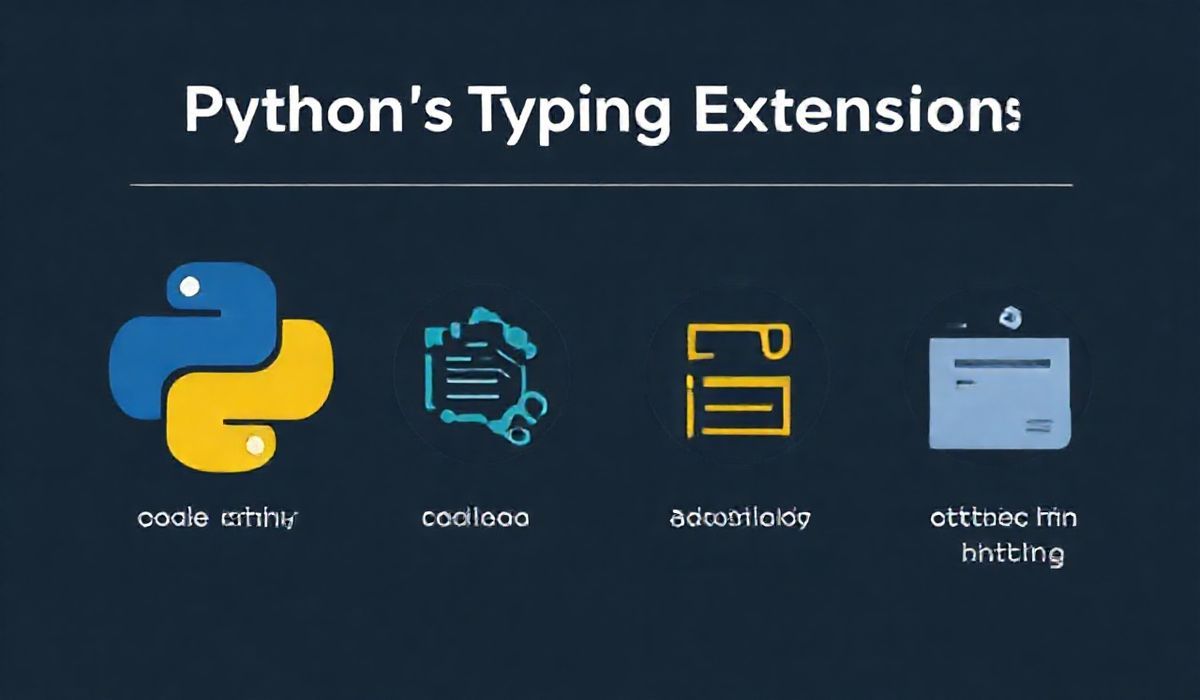Introduction to Typing Extensions in Python
The typing-extensions library is a powerful addition to Python’s type hinting system, enabling developers to use advanced and future-ready typing features that aren’t available in their current version of Python. This library plays a crucial role in improving code quality, maintainability, and readability by extending the typing support. In this article, we will explore some of the most practical and useful APIs in typing-extensions with real-world examples. We’ll also build a small app utilizing these features.
Why Typing Extensions?
Python’s built-in typing module contains a set of core type hints for static analysis. However, language features and typing constructs evolve over time. The typing-extensions package backports new type hints from future Python versions into older ones so that developers can keep their codebase modern without waiting for a Python upgrade.
Dozens of Essential Typing Extensions APIs
1. Literal
The Literal type allows you to specify that a variable or parameter must have one or more specific values.
from typing_extensions import Literal
def get_status_message(status: Literal["success", "error", "pending"]) -> str:
if status == "success":
return "Operation successful!"
elif status == "error":
return "An error occurred."
elif status == "pending":
return "Still in progress."
return "Unknown status"
# Example usage
print(get_status_message("success")) # Outputs: "Operation successful!"
2. TypedDict
TypedDict allows you to define dictionaries with a specific structure for their keys and values.
from typing_extensions import TypedDict
class User(TypedDict):
id: int
username: str
email: str
def display_user(user: User) -> None:
print(f"ID: {user['id']}, Username: {user['username']}, Email: {user['email']}")
# Example usage
user_data = {"id": 123, "username": "johndoe", "email": "john@example.com"}
display_user(user_data) # Outputs: ID: 123, Username: johndoe, Email: john@example.com
3. Protocol
With Protocol, you can define structural types, specifying the shape an object must have rather than its specific type.
from typing_extensions import Protocol
class Flyer(Protocol):
def fly(self) -> str:
...
class Bird:
def fly(self) -> str:
return "Bird is flying"
class Airplane:
def fly(self) -> str:
return "Airplane is flying"
def display_flight(flyer: Flyer) -> str:
return flyer.fly()
# Example usage
bird = Bird()
airplane = Airplane()
print(display_flight(bird)) # Outputs: Bird is flying
print(display_flight(airplane)) # Outputs: Airplane is flying
4. Concatenate
Concatenate supports more complex function signatures when used with Callable.
from typing_extensions import Callable, Concatenate, ParamSpec
P = ParamSpec("P")
def log_and_call(func: Callable[Concatenate[str, P], str], msg: str, *args: P.args, **kwargs: P.kwargs) -> str:
print(f"Log: {msg}")
return func(msg, *args, **kwargs)
def sample_function(log_prefix: str, name: str) -> str:
return f"{log_prefix}: Hello, {name}!"
# Example usage
print(log_and_call(sample_function, "INFO", "Alice")) # Outputs: Log: INFO \n INFO: Hello, Alice!
5. @final
The @final decorator marks a method or class as “final,” preventing it from being overridden or subclassed.
from typing_extensions import final
@final
class Singleton:
pass
# This will raise an error
# class Derived(Singleton): pass
class Base:
@final
def important_method(self) -> None:
print("This method cannot be overridden")
# This will raise an error
# class Derived(Base):
# def important_method(self) -> None: pass
A Small App Example with Typing Extensions
Below is a small example showcasing several of these APIs together.
from typing_extensions import Literal, TypedDict, Protocol, final
class Product(TypedDict):
id: str
name: str
price: float
status: Literal["available", "unavailable"]
class DiscountCalculator(Protocol):
def calculate(self, price: float, discount: float) -> float:
...
def get_product_status(product: Product) -> str:
if product["status"] == "available":
return f"{product['name']} is available for purchase"
else:
return f"{product['name']} is currently unavailable"
class BasicDiscount:
def calculate(self, price: float, discount: float) -> float:
return price - (price * discount / 100)
@final
class CheckoutSystem:
def process(self, product: Product, discount_calculator: DiscountCalculator) -> None:
status = get_product_status(product)
print(status)
if product["status"] == "available":
discounted_price = discount_calculator.calculate(product["price"], 10)
print(f"Discounted price: {discounted_price}")
# Example usage
product = {"id": "1234", "name": "Laptop", "price": 1200.99, "status": "available"}
discount = BasicDiscount()
checkout = CheckoutSystem()
checkout.process(product, discount)
This small app uses TypedDict for the product structure, Protocol for the discount calculator interface, Literal for specifying valid statuses, and @final to ensure that the checkout system cannot be subclassed.
Conclusion
The typing-extensions package is a must-have for any Python developer looking to create scalable, future-proof, and maintainable code. By adopting these advanced type hinting techniques, you can significantly improve the reliability and readability of your codebase.




